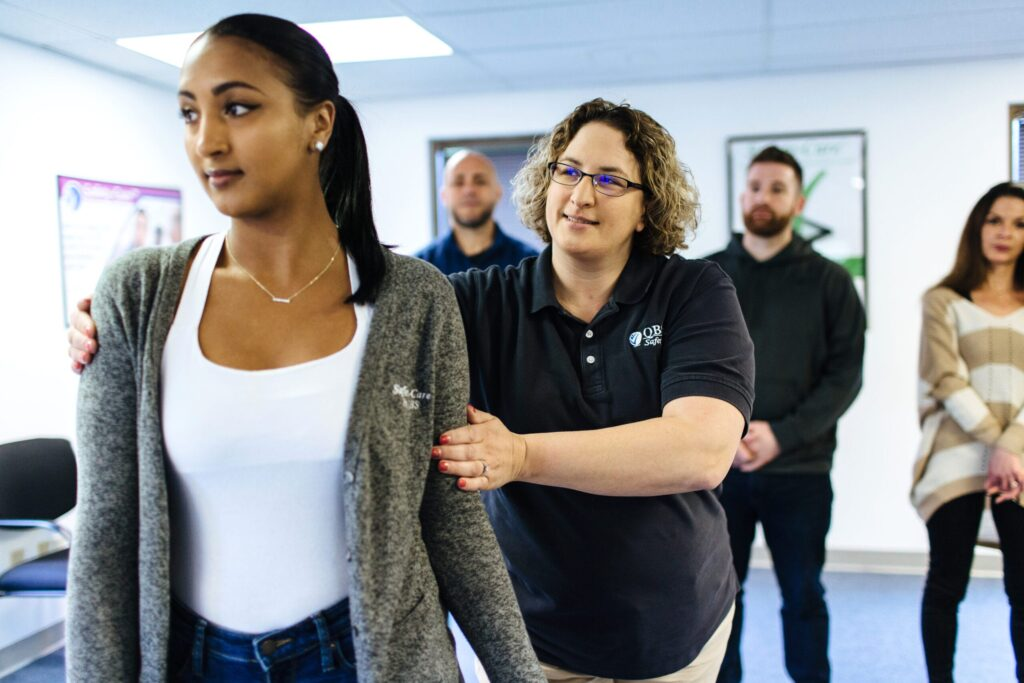Texas Senate Bill 712 – Prohibiting Certain Aversive Techniques on Students in Public Schools
Senate Bill 712 was signed into law on June 10, 2019 and prohibits the use of certain aversive techniques on students enrolled in public schools. Below is a summary of these techniques and information on how Safety-Care can be utilized to improve safety.

.png?width=88&height=95&name=Group%20137%20(5).png)


How to Implement Safety-Care?
1. Register for a Safety-Care Trainer class or call us to request a closed session for your organization. We regularly conduct classes in all 50 states and Canada.
2. Complete your class to become a certified Safety-Care Trainer for your organization. We bring you to fluency using an errorless teaching methodology.
3. You train and certify your staff in Safety-Care’s effective techniques.
4. Our Master Trainers are available by phone, email, or video to help your organization with any questions or concerns while using or implementing Safety-Care.

Legal Requirements
|
Summary: Effective: June 10, 2019 Last Updated: December, 2024 Senate Bill 712 was signed into law on June 10, 2019 and prohibits the use of certain aversive techniques on students enrolled in public schools. Senate Bill 712 was signed into law on June 10, 2019 and prohibits the use of certain aversive techniques on students enrolled in public schools. Below is a summary of these techniques and information on how Safety-Care can be utilized to improve safety. |
These techniques are defined as those that reduce the likelihood of a behavior reoccurring by intentionally inflicting on a student significant physical or emotional discomfort or pain, including the following;
Aversive techniques may be used in limited circumstances if the technique does not cause discomfort or pain and complies with individual education or behavioral intervention plans A school district or school district employee or volunteer or an independent contractor of a school district may not apply an aversive technique, or by authorization, order, or consent, cause an aversive technique to be applied, to a student. How Safety-Care aligns: Safety-Care training can help meet the requirements set forth in SB 712. Safety-Care promotes the use of de-escalation prior to the use of any physical management. Physical management techniques are designed to ensure the safety of all participants and are only to be used until the situation has de-escalated. Safety-Care can be designed and taught to match local requirements regarding restraint but always focuses on the least restrictive and safest methods. All physical management techniques are role-played by trainees to ensure that they fully grasp the need for minimum restriction and full safety of all participants. Our Master Trainers verify each trainees use of these techniques in role-play, further ensuring their safe use. Each trainee must prove mastery of proper technique use before they can be certified in Safety-Care. Safety-Care prohibits the use of chemical restraints. |
Why Safety-Care?
Benefits & Differentiators
In addition to Safety-Care being highly cost-effective, you get:

Skills to effectively prevent, minimize, & manage behavioral challenges with dignity, safety, & the possibility of change

Decreases in staff and patient injuries and reduction in restraint & seclusion time

Instructional procedures based on decades of evidence-based research & compatible with ABA, PBIS & reinforcement-based environments

Customizable program for your setting, staff & clientele, with a strong focus on preventative via non-intrusive, replacement behaviors

Extremely rigorous standards grounded in errorless teaching methodology

Small, intimate class sizes backed by unlimited support & resources
How Is Safety-Care So Effective?
A Genuine Focus on Implementing & Managing Positive Behavioral Skills
Proactive, environmental management recommendations
Understanding of evocative effects of staff behavior
In-depth analysis of antecedents and proactive antecedent interventions
Evidence-based reinforcement procedures
Required competency in de-escalation skills
Humane, non-invasive touch and QBS Check™ strategies
Evidence-based teaching procedures
Applicable to a wide array of settings, conditions & challenging behavior





